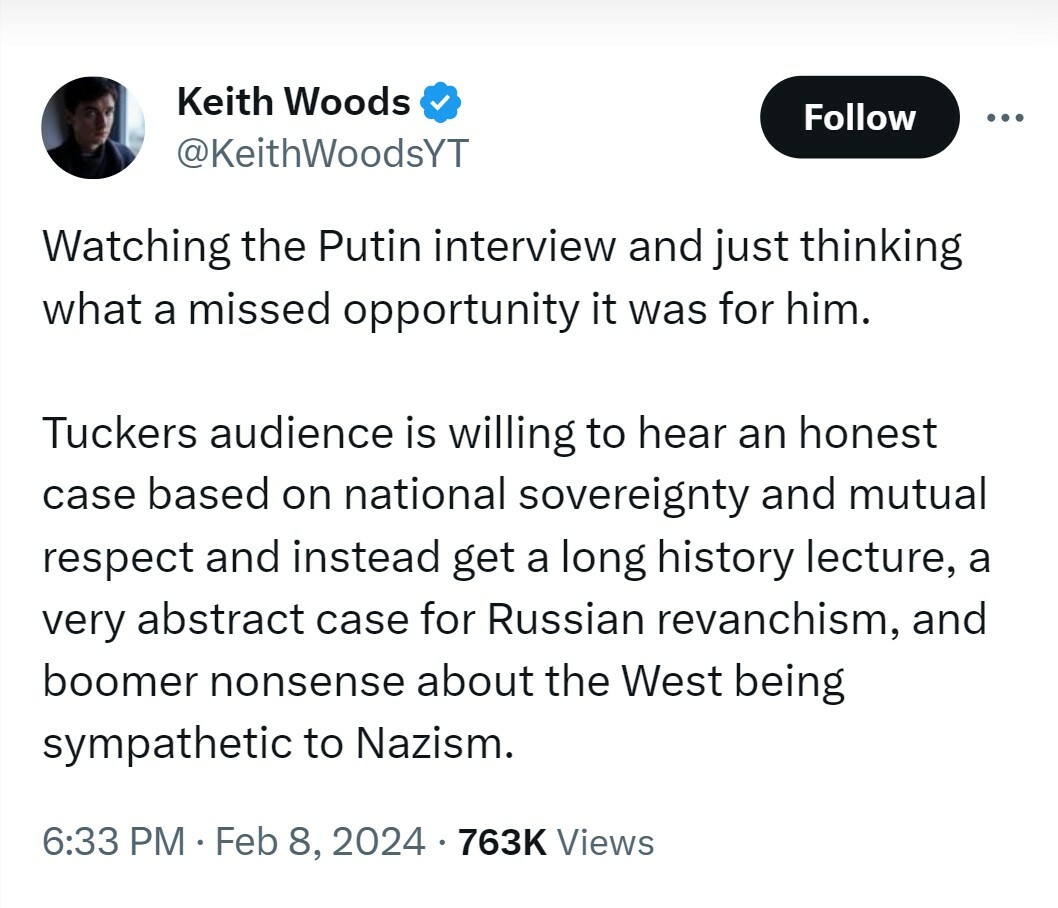The Three Mysteries of Vladimir Putin’s Two-Hour Talk Show
Tucker Carlson’s two-hour interview with Vladimir Putin on February 8 sparked much controversy but clarified little.
I would say the interview was well-framed by Putin’s early rebuke when he asked: “Is this a serious conversation or a talk show?”
The two seemed on opposite sides. Putin gave the bubbly, cantankerous journalist a condensed thousand-year history lesson about Russia. Carlson listened in dazed silence.
The Impact of the Interview
The interview was not entirely successful for Putin. Even the sympathetic Tucker Carlson admitted that the Russian leader had not presented his case coherently. Most commentators wrote it off as a rambling justification for Russia’s unjust invasion of Ukraine on February 24, 2022.
If most of American public opinion refused to warm to Putin, the same cannot be said for what was probably the interview’s real target audience. Sadly, Putin holds a fascination for a particular sector of the American public. Commentaries from some conservatives, even Catholic ones, raved about the interview and its “history lesson.” They said they were captivated by the profundity of the historical comments of the former KGB agent that could “reshape the world.”
I think part of this enthrallment comes from a desire to fit Putin into a narrative that many would like to believe, even if it is a fantasy. Amid a Davos-molded world, these conservatives fantasize that this former Davos attendee is an outlier who defends Christianity and the interests of the ordinary people. He is an international insider who has gone rogue. The truth, however, is quite different.
Imagining Putin as He Isn’t
What especially attracts these Putin supporters is the religious side of the fictional narrative. The ex-KGB lieutenant colonel is portrayed as a religious figure because the Russian Orthodox Church supports his agenda. He is compared to Constantine, or even Saint Paul, being seen as the converted hero figure who takes on a corrupt and secular world.
For this niche audience, the Carlson interview was a podium allowing Putin to present this persona. The most important part of the interview was this presentation of the man and his ideas, not his rushed revisionist dissection of historical incidents that will result in endless debates about Eastern European history.
Three mysteries in Putin’s “history lesson” concerned me, and I was surprised that many others did not see or want to see them. These mysteries cloud the figure of Putin as many wish to perceive him. They call into question his version of the Ukrainian conflict.
First Mystery: Soviet Russia’s Crimes Are Purged from Putin’s Historical Memory
The first mystery is Putin’s treatment of Russia’s Soviet past. Given his current Russian nationalist narrative, the interview would have been an ideal opportunity for him to complain of an outside Western ideology (Marxism) financed by an outside power (Germany) imposing itself upon Russia during the Soviet era, destroying its culture and civilization.
However, during the interview, Putin embraced the Marxist period as part of Russian history, sweeping the horrific crimes of the Soviet regime under the rug.
He found fault with Lenin and Stalin only for creating the Ukrainian Soviet Socialist Republic of the Soviet Union “for unknown reasons.” The most he admitted during the whole interview was that there were some problems in “Stalin’s time, so-called Stalin’s regime—which, as many claim, saw numerous violations of human rights and violations of the rights of other states.”
Unmentioned in his “history lesson” were the Gulag Archipelago, Iron Curtain and Berlin Wall. Unmentioned also were the tens of millions who died in the Sovietization of the former Russian Empire. Especially missing are those who perished in the Ukrainian Holodomor, the 1931-1932 induced famine where at least four to five million Ukrainians starved to death. During the rambling interview, the word communism and its victims went unmentioned.
This former KGB lieutenant colonel did not lament the communist creation of an anti-Russia. There was no acknowledgment of an error, no apology for the crimes, and no indictment of the ideology that destroyed the Russia he claims to cherish.
Unmentioned also was the joy of hundreds of millions when the brutal regime finally imploded and the Wall of Infamy came down.
Second Mystery: The Amnesia Regarding the Ruthless Persecution of the Catholic Church
The second mystery was Putin’s similar omission in his “history lesson” of the persecution of the Catholic Church. I would expect my fellow Catholics to be familiar with the tragic history of the Catholic Church in Ukraine and the rest of the U.S.S.R. under Communism.
Putin constantly identified Russia with Orthodoxy. “Orthodoxy, Eastern Christianity, deeply rooted itself in the consciousness of the Russian people.”
He likewise made this generalization regarding Ukraine (which he considers an integral part of Russia) and insisted that Ukraine shares a common faith with Russia.
Such a depiction dismisses and ignores the nearly five million Ukrainian Catholics now free to practice their Faith. There is a constant anti-Catholic overtone in Putin’s telling of history. He reduces these Catholics to foreign, illegitimate and Western elements implanted into Russian soil. He turns faith into a geographical, not theological, matter.
Indeed, Putin was silent on how the Soviet regime under Stalin ordered a 1946 Lviv synod to decree the forced “reunification” of the Ukrainian Greek Catholics with the Russian Orthodox Church. In 1949, the Greek Catholic church in Transcarpathia was likewise abolished. The Greek Catholic Church went underground during the decades of Soviet rule while willing Orthodox accomplices confiscated and occupied its churches.
After the fall of Communism, Catholic bishops and clergy emerged and reclaimed their churches. Clergy and entire congregations converted to the Catholic Church from Orthodoxy.
Ukrainian Catholics know full well that if Putin succeeds in his goal to swallow Ukraine into Russia again, he will do his utmost to obliterate the Catholic Faith from Ukraine. Those Catholics who revere Putin should pay close attention to the voiced fears of their fellow Catholics in Ukraine.
Third Mystery: Putin’s Very Modern View of Religion
The final mystery in the Tucker Carlson interview was Putin’s refusal to talk about God. Inside the narrative where he plays God’s champion, he should be expected to proclaim his Christian Faith.
Tucker Carlson made such a mention easy by asking a soft-ball question: “You are a Christian leader by your own description. So, what effect does that have on you?”
Putin’s reply was to avoid any personal reference to faith or specific belief. Orthodoxy is only mentioned as a nationalist label identifying the Russian people.
Putin’s vision of religion in the interview was a liberal one of religious indifference. When he mentioned that Russia “absorbed nations” who professed Islam, Buddhism and Judaism, he omitted saying anything about the Catholic Faith. However, Putin ecumenically claimed the equality of all religions, saying, “the main postulates, main values are very similar, not to say the same, in all world religions I’ve just mentioned.”
Nor were his references to Divine worship profound. He said religion is “not about external manifestations, it’s not about going to church every day or banging your head on the floor. It is in the heart.” To him, it was much more about the dark genius of Dostoevsky (whom he referenced) than the sublime works of Saint John Chrysostom (347-407), the Catholic author of the Eastern liturgy mainly used by Orthodoxy everywhere.
God’s Role in History
Tucker Carlson gave the Russian leader one more chance to manifest his faith by asking him if he saw the supernatural or God in what is happening in the world today. Did he recognize “forces that are not human” at work?
Far from Constantine’s vision of victory through the Cross of Christ before the Battle of the Milvian Bridge (312), Vladimir Putin’s answer to Carlson was a crushingly disappointing “no.”
His vision of history was not driven by God but by materialistic power—a perspective with both Marxist and Nietzschean overtones.
“My opinion is that the development of the world community is in accordance with the inherent laws, and those laws are what they are. It’s always been this way in the history of mankind. Some nations and countries rose, became stronger and more numerous, and then left the international stage, losing the status they had accustomed to.”
Indeed, in Putin’s view, the fall of the Roman Empire was due to the growing economic power and development of the barbarians—a Marxist perspective. There is no mention of the triumph of Christianity as a major factor in the rise of the West.
Rejecting the Charade
Thus, the Putin interview was shrouded in mystery and clarified nothing. The interview seemed designed to open up passionate debates about the details of past events, which will persuade neither side. There appeared to be a desire not to solve problems but rather to multiply them ad infinitum with mutual recriminations—some of them legitimate.
Putin’s omissions about the unnaturalness and crimes of Communism cast doubt on his narrative since it would have been so easy for him to condemn this scourge of humanity that so destroyed his country. Putin’s unmentioned Soviet goal to eliminate the Catholic Church in Ukraine should lead Catholics worldwide to withdraw sympathy.
Putin’s shallow notions of the impact of religion on history should lead us to see no future in his program. We see in his views a twisted, mixed bag of nineteenth-century philosophers like Hegel, Nietzsche, and Marx that have brought us to where we are today.
Nothing in Putin’s ideas and actions presages the refreshing movement of God’s grace that has converted peoples and changed history through the ages. His revisionist musings have nothing to do with the message of Our Lady of Fatima that promised Russia’s conversion.
Until these mysteries are resolved, I cannot engage in this debate with this false narrative. It is not a serious conversation. It is a talk show.











